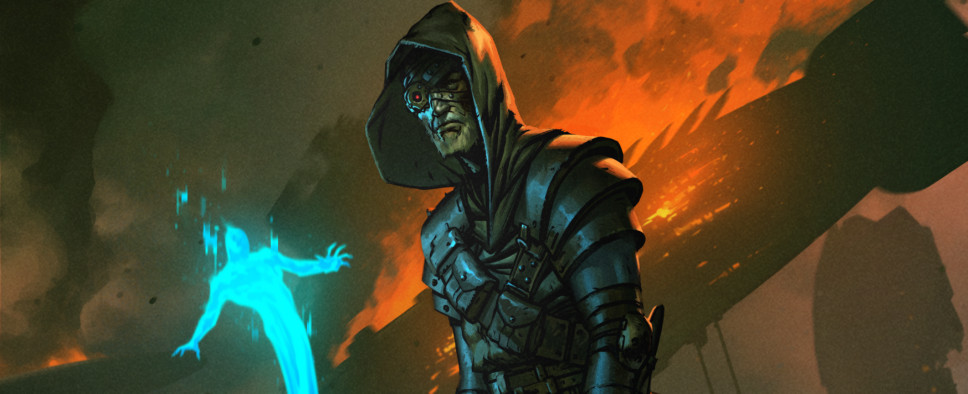Seven: The Days Long Gone Interview
-
Category: News ArchiveHits: 1723

Seven: The Days Long Gone, an isometric stealth-action RPG from Fool's Theory and IMGN.PRO, is releasing in roughly a month and a half, on December 1, 2017. And before we get to see for ourselves what parkour and freedom of movement add to an isometric RPG and how it all works, Twinfinite brings us this interview with the game's director Jakub Rokosz and composer, Marcin Przybyłowicz.
In the interview, the two developers talk about what makes Seven a unique RPG, the game's setting that belnds sci-fi and fantasy, the music and sound design, and what it's like to transition from working for a large studio like CD Projekt RED to leading your own team of 20 people. Some good stuff in there. An excerpt:
Alex Gibson from Twinfinite: CRPGs have been using the isometric perspective for years, and there are well-established franchises that have continued this trend in modern gaming. Do you feel that the parkour and stealth elements to Seven’s gameplay are enough to make it stand apart from popular titles such as Divinity Original Sin and Diablo III?
Jakub Rokosz: We understand that Seven will be compared to games like that because of its isometric perspective, but we believe that our game is original enough to stand out from the crowd. We always wanted to respect the isometric RPGs that we’re so fond of, but see Seven as being a breath of fresh air within the genre. The main way we do this is by giving the player freedom of movement and choice in the game world.
Twinfinite: When conceptualizing Seven, were mechanics like stealth and parkour part of a brainstorming process specific to this project or are these gameplay mechanics you’ve always wanted to see incorporated into a role-playing game?
Rokosz: Yes and no. Parkour was always planned, and stealth naturally emerged from it, as well as the 360-degree rotatable camera, but all of those features were more or less means to achieve the goal we set before ourselves. Our main focus was to give freedom of movement to the player, so most importantly: no invisible walls, no place unclimbable. I always hated the feeling of being stuck to the ground in old RPGs, or seeing an awesome vista while progressing through hell in Diablo, but being unable to go there.
For me, the most irritating feeling I experienced while playing an RPG was encountering a decoration made of millions of gold coins and treasure chests, but that are only static objects; you could only loot the single chest that was in the “playable zone.” While making Seven, it wasn’t really a matter of incorporating parkour into the genre but giving the player the freedom to do, loot, and explore whatever areas they want. Parkour was the best means of doing that.
[...]
Twinfinite: I couldn’t help but notice the game’s score has been composed by Marcin Przybyłowicz — whose previous work includes The Witcher 3. What role does the score play in bringing to life world of Seven and relaying the tone of its story?
Rokosz: I could answer that, but I would rather give Marcin the opportunity to voice his thoughts. Marcin – take it away:
Marcin Przybyłowicz: Hi! Actually, quite significant I think. Since its inception, Seven was always appealing to me with its suggestive vision. It’s not common to work on a project that allows the composer to have that much creative freedom. A carte blanche really. One of the examples of such freedom is the overall sound palette we chose for this project. We started with a simple idea – it’s a “beyond-apocalypse” setting, so we thought Peh’s citizens would use all the scrap they can scavenge to build anything, including instruments they’d use for their own amusement. Why not try to record such instruments in real life and make them one of the pillars of Seven’s sound?
We reached out to Paweł Romańczuk, leader of the Małe Instrumenty project – old instruments’ collector, and a constructor. Paweł let us explore his workshop and record some of his most significant artifacts, including Bucket Bass (made out of a metal bucket and one bass string), Cardboard Cello (made out of an office chair leg, cardboard tube, cello strings and guitar pickups), authentic, 100-years-old Stroh Violin, and so on. There was some really exceptional stuff there; very raw and authentic in its sound.
The other pillar of Seven’s sound are elements of the western genre. For me, the reality of the Vetrall Empire has much of a Wild West vibe, so I wanted to pour some of it into the music as well. That’s why we have lots of sounds recorded on guitars – resonator guitar, cigar box guitar, twelve-string guitar, electric guitars, etc.
I think we did something special here, to make this grim reality of Seven’s world breathe and have its own voice. I really hope our audience will fall in love with it the same way I did!

